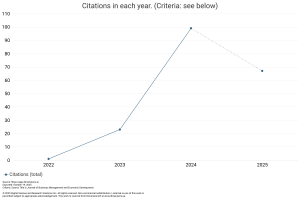The Influence of Organizational Culture on the Performance of Non-Permanent Employees in the Department of Public Works and Spatial Planning of Paser District
DOI:
https://doi.org/10.59653/jbmed.v2i03.865Keywords:
Organizational Culture, Employee Performance, Public WorksAbstract
The aim of this research is to determine the influence of Organizational Culture (X) on the Performance of Non-Permanent Employees (Y). The total number of respondents was 52 respondents. The analysis used in this research is simple regression analysis. The results of the validity coefficient for the 14 statement items are 14 valid items and 0 are invalid so it can be concluded that the 14 statement items are valid as a measuring tool because they have rcount > rtable, namely 0.2732. The results of the researcher's reliability variable calculations can be concluded that all statement items are reliable as measuring tools because the Cronbach's alpha value is 0.900 > 0.60. This simple linear regression can be explained as follows: A constant of 2.231 means that the performance of non-permanent employees at the Paser Regency Public Works and Spatial Planning Service will remain at 2.279 if (X) the cultural factor remains constant or there is no change. Based on the research results, it is known that the R value is 0.717 or 71.7%, this means that there is a strong relationship between the Organizational Culture variable (X) and the employee performance variable (Y), while the coefficient of determination is 0.514 or 51.4%, meaning the performance variable employees (Y) are explained by the organizational culture variable (X), amounting to 51.4% while the remaining 48.6% is explained by other variables not included in this research. From the t test results of the organizational culture factor (x), the calculated t value is 7.278 > t table of 2.00856, which means that the organizational culture factor (x) influences employee performance at the Paser Regency Public Works and Spatial Planning Service with a significant level of 0.000 < 0 .05. So it can be concluded that the hypothesis can be accepted or H0 is rejected and Ha is accepted, because the organizational culture factor (x) has a strong influence on employee performance at the Paser Regency Public Works and Spatial Planning Service.
Downloads
References
Asidah, Erwin. (2022). Etika Bisnis Era Milenial. Lombok Tengah: IKAPI.
Bintoro, Daryanto. (2017). Manajemen Penilaian Kinerja Karyawan. Yogyakarta. Gava Media.
Dasmadi. (2021). Pengaruh Budaya Organisasi, Lingkungan Kerja, Kompensasi Terhadap Kinerja Melalui Kepuasan Kerja dan Motivasi Pegawai. Klaten, Jawa Tengah: Penerbit Lakeisha.
Djaali. (2020). Metodologi Penelitian Kuantitatif. Jakarta: Bumi Aksara.
Hasibuan, Malayu S.P. (2019). Manajemen Sumber Daya Manusia. Jakarta: PT Bumi Aksara.
Hermawan, Iwan. (2019). Metodologi Penelitian Pendidikan Kualitatif, Kuantitatif dan Mixed Method. Kuningan: Hidayatul Quran Kuningan.
Larasati, Sri. (2018). Manajemen Sumber Daya Manusia. Yogyakarta: CV. Budi Utama.
Luwihono Andung, Jemi V Palpialy. (2021). Buku Ajar Instrumentasi dan Pengukuran. Jaya Pura: IKAPI.
Muryati. (2022). Perilaku Organisasi Analisis Kepemimpinan dan Kinerja Pegawai. Malang: CV. Literasi Nusantara Abadi.
Nalendra, Aloysius Rangga Aditya et.al. (2021). Statistika Seri Dasar Dengan SPSS. Bandung: CV. Media Sains Indonesia.
Priyatno, Duwi. (2013). Analisis Korelasi, Regresi dan Multivariate Dengan SPSS. Yogyakarta: Gava Media.
Priyono. (2021). Analisis Regresi Dan Korelasi Untuk Penelitian Survei. Bogor: Guepedia.
Ramdhan, Muhammad. (2021). Metode Penelitian. Surabaya: Cipta Media Nusantara.
Sobirin, Achmad. (2019). Budaya Organisasi Pengertian, Makna, dan Aplikasinya Dalam Kehidupan Organisasi. Yogyakarta: UPP STIM YKPN.
Sujarweni, V. Wiratna. (2015). Statistik Untuk Bisnis & Ekonomi. Yogyakarta: Pustaka baru Press.
Sunyoto, Danang. (2012). Teori, Kuesioner, dan Analisis Data Sumber Daya Manusia. Yogyakarta: CAPS (Center for Academic Publishing Service).
Sutrisno, Edy. (2019). Budaya Organisasi. Jakarta: Prenadamedia Group.
Wibowo. (2016). Budaya Organisai : Sebuah Kebutuhan Untuk Meningkatkan Kinerja Jangka Panjang. Jakarta: PT Raja Grafindo Persada.
Wibowo, Agung Edy. (2021). Metodologi Penelitian : Pangan Untuk Menulis Karya Ilmiah. Cirebon: Grup Publikasi Yayasan Insan Shodiqin Gunung Jati.
Widiyanti Wiwik, Dewi Fitriani. (2017). “Motivasi Kerja Terhadap Kinerja Pegawai pada Dinas Kependudukan dan Pencatatan Sipil Kota Depok. Jurnal Humaniora. Vol. 17. No.2. Hal 13-21
Yadnya, Idewa Adi. (2022). Berbagai Faktor Bagi Peningkatan Kinerja Pegawai. Sulawesi Tengah: CV. Feniks Muda Sejahtera.
Peraturan Pemerintah Republik Indonesia Nomor 41 Tahun 2007 Tentang Organisasi Perangkat Daerah.
Peraturan Bupati Paser Nomor 44 Tahun 2021 Tentang Kedudukan, Susunan Organisasi, Tugas dan Fungsi, Serta tata Kerja Dinas Pekerjaan Umum dan Tata Ruang Kabupaten Paser.
Downloads
Published
How to Cite
Issue
Section
License
Copyright (c) 2024 Istiqomah, Ibnu Khayath Farisanu, Isnaini Nisa Alhusna

This work is licensed under a Creative Commons Attribution-ShareAlike 4.0 International License.
Authors who publish with this journal agree to the following terms:
- Authors retain copyright and grant the journal right of first publication with the work simultaneously licensed under a Creative Commons Attribution-ShareAlike that allows others to share the work with an acknowledgement of the work's authorship and initial publication in this journal.
- Authors are able to enter into separate, additional contractual arrangements for the non-exclusive distribution of the journal's published version of the work (e.g., post it to an institutional repository or publish it in a book), with an acknowledgement of its initial publication in this journal.
- Authors are permitted and encouraged to post their work online (e.g., in institutional repositories or on their website) prior to and during the submission process, as it can lead to productive exchanges, as well as earlier and greater citation of published work (See The Effect of Open Access).





























